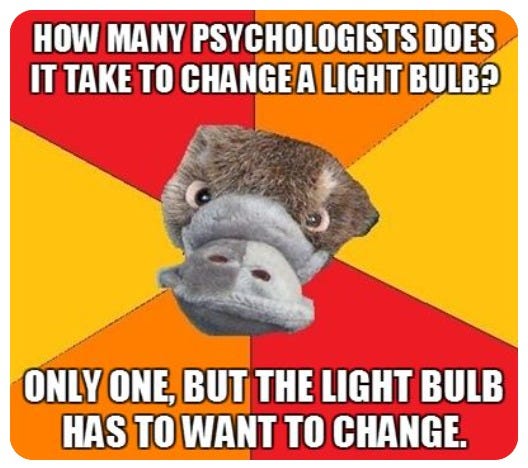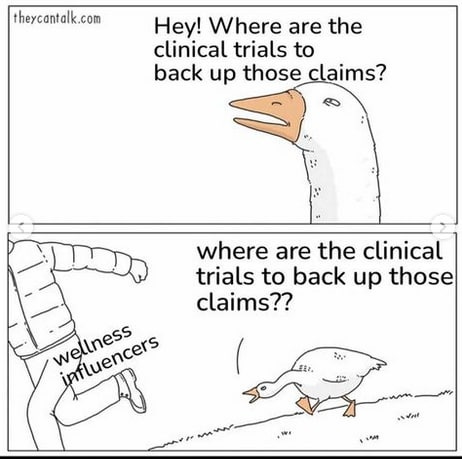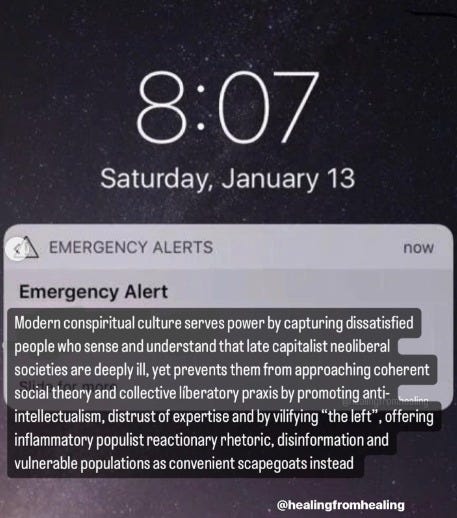Issue Seven: Focus On Cults
"If we keep considering the self as the individual there's no hope for us. The mind is as relational as it is inner" - Dan Siegel
Welcome to the 50 or so new subscribers who have joined us since the last issue! You can go back and see the previous issues on our Substack homepage or on our website where you can also find links to our socials and some background information on the project. Hope you stick with us and of course feel free to make suggestions in the comments on what we can add, remove, or improve as we go. Now on to the meat of this issue!
We’ve recently seen a resurgence of interest in cults and cult dynamics in popular culture. Streaming services are churning out documentaries about them at a furious rate. The widening of the definition of culty behavior to include ‘coercive control’ (not least in the legal systems of certain countries) means that relationships and groups which previously would not have been recognised as ‘cults’ because they don’t fit the definition of ‘charismatic figure with followers holed up in rural compound’, are now being seen for what they are.
We at The Elevator consider ourselves part of a Global Consciousness Movement, and we recognise that within that movement there is a shadow side, one which often displays culty dynamics, is susceptible to paranoid and magical thinking, to ‘inflation’ (i.e. identifying the personal ego with the Divine), not to mention the blending of spirituality and ‘personal branding’ on social media with MLMs and cults of all types. To be frank, it’s a bit of a mess, and as part of our medium-term intention to map the ‘consciousness space’ we would like to shine a light on this whole area, without necessarily telling people what to think. We believe that discernment is one of the key virtues in this current era of confusion and denial. It is hopefully a powerful medicine against dogmatism on all sides and a generalized lack of critical thinking. We would like to be part of a ‘cultural immune system’ which detects and filters out culty criminals before they get their hooks into people.
By the way, including organizations or individuals in the section titled ‘Focus on Cults’, we are not necessarily implying that they are ‘cults’, are involved with ‘cults’, or even that apparent ‘cult’ dynamics are always negative, even though of course they very often are. Everything we present in this newsletter, as always, is in the spirit of ‘food for thought’. If you have any thoughts on cults and coercive control, or even personal experiences you’d like to share, please let us know in the comments. This is part one of a two-parter on cults, by the way. In the second part, coming next week-ish, we will be considering whether an ‘ethical cult’ is a possibility.
Table of Contents
Events
Roland Griffiths, Beloved Psychedelic Researcher, Dies at 77 | DoubleBlind Mag
Meditation, Psychedelics, Mortality: A conversation with Tara Brach and Roland Griffiths
TESCREAL hallucinations: Psychedelic and AI hype as inequality engines
How the 3 steps of “adaptive plasticity” can grow your brain and make learning easier
Did inhaling nitrous oxide — and glimpsing madness — inspire Roget’s Thesaurus?
Psychedelics and psychic ability have a long history
Focus on Cults
Podcasts About Cults and Their Enduring Sinister Attraction - The New York Times
The 15 Most Compelling Cult Documentaries and Docuseries Available to Stream Now
Manifestation coaches preach a phony "prosperity gospel" - Big Think
How Cults Form (realtime Instagram investigation)
Kat Torres: under the influence - by Jules Evans
Why Some People Hand Their Lives Over to Cults
Conspiracy theories: how social media can help them spread and even spark violence
Get the lowdown on 'e/acc' — Silicon Valley's favorite obscure theory about progress at all costs
Alex Jones and the Wellness-Conspiracy Industrial Complex - The New York Times
Nuggets From The Archive
The real Avatar: body transfer turns men into girls | New Scientist
Meme to Vibe: A Philosophical Report - by Peter N Limberg
Montreal Brain Imaging Study Shows Reduced Reactivity with Mindfulness - Numinus
Bigelow Essays: Steven Braude, Ph.D.—A Rational Guide to the Best Evidence of Postmortem Survival
Events
Dr. David Luke's Talks | Eventbrite
Dr David Luke is Associate Professor of Psychology at the University of Greenwich, UK, where he has been teaching an undergraduate course on the Psychology of Exceptional Human Experience since 2009. David is the founder of Breaking Convention conference. All talks are in-person and in the UK. The first one is in Cardiff on Wednesday, Nov 8, 2023.
Spirit Plant Medicine Conference
November 3, 2023, Vancouver, BC
Psychedelics 101: A Roadmap to Navigating Mind Altering Substances (3-Week Online Course - Psychedelic Society UK)
Starts on Wed 22nd Nov 2023. “In a comprehensive and thought-provoking course, we’ll be exploring psychedelics 101, covering all basic grounds. The course will span across time, from ancient psychedelics origins to modern neuroscience, and across the globe, delving into the global psychedelic renaissance of today. You will also be given an overview about how to navigate and make the most out of your own conscious-expanding journey, in a safe and integrated way.”
Wonderland Conference
Nov 9-11 | Miami, Florida. “Psychedelics. Longevity. Mental Health. Discover The Future of Wellness”
Links
Roland Griffiths, Beloved Psychedelic Researcher, Dies at 77 | DoubleBlind Mag
Dr. Roland Griffiths, a beloved psychedelic researcher, passed away at his Baltimore home on October 16th after a months-long battle with metastatic colon cancer. He spent over two decades studying the therapeutic potential of psychedelics for end-of-life distress and other mental health ailments, and his work catalyzed a new era in psychedelics research. His end-of-life studies are largely credited with legitimizing psilocybin as a medicine following a decades-long halt on psychedelic science.
Meditation, Psychedelics, Mortality: A conversation with Tara Brach and Roland Griffiths
This conversation between the meditation teacher Tara Brach and the late psychedelic researcher Roland Griffiths explores the relationship between meditation and psychedelics, and how they both can serve profound spiritual awakening and deep inner freedom in the face of mortality.
TESCREAL hallucinations: Psychedelic and AI hype as inequality engines
“While many scholars have called attention to similarities between the earlier SSRI hype and the ongoing hype for psychedelic medications, the rhetoric of psychedelic hype is tinged with utopian and esoteric aspirations that have no parallel in the discourse surrounding SSRIs or other antidepressants. This utopian discourse provides insight into the ways that global tech elites are instrumentalizing both psychedelics and artificial intelligence (AI) as tools in a broader world-building project that justifies increasing material inequality. If realized, this project would undermine the use of both tools for prosocial and pro-environmental outcomes.”
How the 3 steps of “adaptive plasticity” can grow your brain and make learning easier
The concept of neuroplasticity involves the brain's capacity to rewire itself through learning or experience. Focusing on "adaptive plasticity," the type shaped by repeated actions, examples like London cabbies and Braille readers are given to show structural brain changes. The brain undergoes a three-step transformation — chemical, structural, and functional changes — to facilitate learning. Repetition is crucial for building myelin and altering brain wiring.
Did inhaling nitrous oxide — and glimpsing madness — inspire Roget’s Thesaurus?
Thomas Hodgkinson suggests that Peter Mark Roget’s early experience of taking nitrous (with the scientist Humphrey Davy), plus his propensity to compulsively make lists, might have contributed significantly to his eventual production of the Thesaurus of English Words and Phrases.
Psychedelics and Psychic Ability with Sean McNamara
Psychedelics and psychic ability have a long history, with native traditions using psychedelics to expand the mind and access information. Andrija Puharich, a well-known neurosurgeon, conducted research on psychedelic effects on psychic functioning in the 1960s. Puharich's experiments suggested that psilocybin enhances clairvoyance and psychic abilities. Practicing psychic abilities requires perseverance and surrendering the ego, as it is a probabilistic and psychological process. The interviewee on this podcast, Sean McNamara, has trained himself and others in various psychic abilities, including out-of-body experiences.
Materialism: Consciousness arises from matter and begins in time. We have it because we’re a complex life-form.
Idealism: Consciousness arises from nowhere and begins nowhen. We don’t have it, it has us.
Focus on Cults (Part One)
6 Podcasts About Cults and Their Enduring Sinister Attraction - The New York Times
Emma Dibdin chooses six podcasts about cults that come at the subject from multiple angles. Some explore the psychology of cult leaders and their victims over the years, including a re-examination of the Manson murders and an exposé on the upstate New York “sex cult” Nxivm, while others focus on how cultish thinking can bleed into our everyday lives.
The 15 Most Compelling Cult Documentaries and Docuseries Available to Stream Now
Includes documentaries about NXIVM (the must-watch series The Vow), Heaven’s Gate, Scientology, Jonestown, and various others, including lesser known cults.
Manifestation coaches preach a phony "prosperity gospel" - Big Think
Manifestation coaches offer a revamped law of attraction, tying self-worth to the ability to attract success. They often sell pricey workshops and promote a spiritualized "growth mindset," encouraging followers to pursue even unrealistic goals. While optimism has merits, this approach can ignore real-world challenges and, taken to extremes, risk fostering delusional thinking.
How Cults Form (realtime Instagram investigation)
Another banger from healingfromhealing: “David Attenborough voice: “And here we can see a baby cult being born in the wild. It is very young, but its teeth are sharp…”
Kat Torres: under the influence - by Jules Evans
“Another online influencer is arrested for human trafficking, and for ayahuasca-fuelled 'shamanic charlatanism'” — the case of Kat Torres (post is behind the Substack paywall, but we do recommend subscribing as this account has consistently good material).
Why Some People Hand Their Lives Over to Cults
"Abdication syndrome" describes the phenomenon where individuals surrender personal responsibility to follow cults or corrupt leaders. This possibly stems from an unconscious yearning for a childlike state, with leaders as parent-like figures. The syndrome often involves an altered state of consciousness akin to hypnosis. The pathological dynamics between authoritarian leaders and followers are deemed to be inherently doomed.
Conspiracy theories: how social media can help them spread and even spark violence
Christine Abdalla Mikhaeil discusses the harmful real-world consequences of conspiracy theory beliefs and misinformation, including inciting violent or extremist behaviors. Social media can help breed a shared identity toward conspiracy theory radicalization by acting as an echo chamber for such beliefs. She identifies four key stages in the escalation of such conspiracy beliefs: identity confirmation, identity affirmation, identity protection, and identity enactment. She suggests policymakers focus on prevention and support education, developing media literacy and critical-thinking skills that can help citizens assess the credibility and validity of online information sources, and addressing the underlying social issues that can contribute to the spread of conspiracy theories.
Get the lowdown on 'e/acc' — Silicon Valley's favorite obscure theory about progress at all costs
Effective Accelerationism (e/acc) is a new Silicon Valley ideology, sometimes said to have cult-like elements, that has been embraced by tech power players, including Marc Andreessen. The basic idea of the philosophy is that in a technological age, the powers of innovation and capitalism should be exploited to their extremes to drive radical social change, even if that means completely upending today's social order. The goal is to create AGI, or a kind of superintelligence as powerful as the human brain, that has become something of a holy grail for certain parts of the AI field.
Alex Jones and the Wellness-Conspiracy Industrial Complex - The New York Times
Farhad Manjoo discusses the health products sold on Alex Jones's site, including diet pills, toothpaste, and supplements. During Jones’ defamation trial, an attorney asked if the products had been tested for effectiveness, to which an anchor for Infowars replied that they test the products themselves.
Nuggets
The real Avatar: body transfer turns men into girls | New Scientist
Researchers have conducted an experiment that shows that body ownership can be transferred to an entirely virtual body. The experiment involved 24 men wearing a head-tracking video display and seeing a 10-year-old girl's body in place of their own. They also saw a virtual woman approaching them and stroking their virtual girl’s arm, while in the real world unseen experimenters touched the men’s flesh-and-blood arm. The men reported medium-strength feelings about the girl’s body being their own, and strong feelings that the woman was touching their body. The findings could lead to therapies for conditions of body-image distortion such as anorexia.
Meme to Vibe: A Philosophical Report - by Peter N Limberg
Limberg explores the evolving societal consciousness from a meme-centric to a vibe-centric paradigm, juxtaposing the intellectual comprehension and replication of memes with the sensory perception and experiential essence of vibes. He delves into the philosophical connotations of "vibe" as a collective sentiment transcending propositional knowledge, fostering a shared reality through "vibe consciousness." The discussion extends to the drawbacks of "meme consciousness," characterized by mindless internet engagement, in contrast with the more connected, intuitive essence of vibing, hinting at a shift towards a more conscious, empathetic societal interaction.
Montreal Brain Imaging Study Shows Reduced Reactivity with Mindfulness - Numinus
A study conducted by the Université de Montréal examined brain function changes underlying a mindfulness state of awareness while processing emotionally charged pictures. The study found that mindfulness was related to reduced activity in thought-related brain areas, indicating that the mechanism through which mindfulness attenuates arousal to emotional events is attained through secondary thoughts and judgments triggered by arousing events.
Spontaneous Spiritual Awakenings: Phenomenology, Altered States, Individual Differences, and Wellbeing
The study investigates Spontaneous Spiritual Awakenings (SSAs), which are subjective experiences characterized by a sudden sense of direct contact, union, or merging with a perceived ultimate reality, the universe, or the divine. The study aims to investigate the potential phenomenological differences between SSAs and Spontaneous Kundalini Awakenings (SKAs), a subset of awakening experiences that may produce a higher likelihood of both physical and negative effects. The study also assesses how these experiences compare to other altered states of consciousness (ASCs) and understand their impact on mental wellbeing.
Bigelow Essays
Steven Braude, Ph.D.—A Rational Guide to the Best Evidence of Postmortem Survival
Stephen E. Braude's paper explores the empirical and philosophical complexities of researching postmortem survival, or life after death. He argues that the inquiry is not purely empirical and rests on various abstract presuppositions. Braude categorizes counter-explanatory options into "Usual" and "Unusual Suspects," and introduces the challenge of "Living-Agent Psi," which posits that living individuals could use psychic abilities to produce phenomena attributed to the deceased.
The paper serves as a nuanced guide for those interested in the empirical and philosophical challenges of researching postmortem survival. It calls for a more rigorous, intellectually honest approach to the subject, and discusses specific cases to illustrate the complexities involved in interpreting evidence for life after death.










